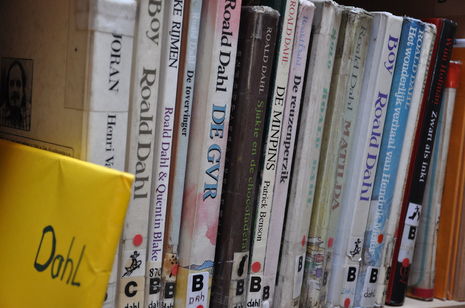Beyond the reading list
Medhansh Kumar lays out the case for reading for pleasure and explores how his relationship with reading has evolved through the years

I remember the first ever all-nighter I ever pulled with remarkable clarity. Unlike most all-nighters since, it did not involve a deadline and copious amounts of pending work. On the contrary, I was quite happy for most of it. This was probably because it was entirely accidental. I’d received a copy of Inkheart, and had begun reading it after dinner. Instead of doing the reasonable thing and putting it down, I found myself thinking, clichéd as it sounds, ‘just one more page’, and ended up finishing the entire thing in one sitting. Inkheart is not a thin book. I saw the sun come up.
My early relationship with reading was a positive one — I read Enid Blyton and Rick Riordan and, later, went through an initiation into macabre short stories, courtesy of Roald Dahl. His impressive range, from morally grey stories like Lamb to the Slaughter to straightforward children’s books like Matilda, reflects the transition from eight to eighteen and the accompanying complications wonderfully.
“The thing I most enjoy about reading is the absence of competition”
Getting into the habit of reading for its own sake, rather than hurriedly scanning Buckland’s Textbook of Roman Law in the (vain) hope of having something intelligent to say for a supervision on consensual contracts was more difficult than it sounds. The thing I most enjoy about reading is the absence of competition. Reading for fun, really, is rather like people-watching — it is outwardly languid but still requires mental involvement. I find, however, that the calming benefit of reading only comes around when I read without work on my mind.
For a long time, however, I thought of reading as productive and fundamentally ‘un-fun’. The presence of social and digital media — engineered to hold human attention — didn’t help. With both school and the broader cultural milieu telling me that reading was a productive thing to be doing, I ended up associating reading with work. I no longer thought of it as a way to relieve stress and relax, which inevitably led to my reading less. Online content (trawling the depths of social media) is, however, a poor replacement. Consuming it is totally passive, whereas reading requires mental engagement, and the instant gratification coming out of the phone is much less satisfying than the delayed gratification a good book brings.
“You can’t enjoy anything if you’re doing it as part of your survival strategy to make it out of late stage capitalism”
Fixing my relationship with reading was hard. It was not simply a question of forcing myself to flip through a few pages and process their contents. That is part and parcel of reading (and there’s a very well substantiated reason they call it reading) law. It was a question of uncoupling reading from the ‘hustle’; you can’t enjoy anything if you’re doing it as part of your survival strategy to make it out of late stage capitalism. Being at Cambridge, with its numerous first- and second-hand bookstores — as well as the University environment generally — helped. It meant that I had access to all the books I could possibly want to read, and many others besides. Extricating reading from the cult of toxic productivity, however, meant that I had to think carefully about the sort of books it pushed — pop psychology and hack’s economics. There’s very little of that, and a great deal more lounging in Oscar Wilde’s works, which I enjoyed both because of their poking fun at the stuffier members of society, and their painting a picture of both the sordidity and earnestness of our sensibilities and emotions (see what I did there!).
I also now conceive of reading for relaxation as my own little way of rebelling against a culture that I see as valuing conformity and money over all else. It is an infinitesimal rebellion — work is still important and digital media and communication is culturally important as well as necessary. Nonetheless, it allows me to think of repairing my relationship with reading as removed from the work habit that necessitated the repairs in the first place. It also means that I separate the structured, organised and methodical reading list from a more intuitive, Marie-Kondoised way of reading for fun (does this spark joy?). That last bit is quite important — I spent four days last week reading the books I’d read around the age of 9; that was what made me feel at ease after going over some convoluted ways of legal reasoning. I then switched to Rebecca by Daphne Du Maurier, just because I was in the mood for the gothic and romantic. After that I turned to Europe since Napoleon, purely because I find the history of the years between the French Revolution and the First World War so essential to how Europe and the European are thought of and about today.
By reading for self-fulfilment, rather than self-improvement (or, as I like to think of it, rounding the square peg to make it fit in better), I was able to build a positive relationship with reading simply by thinking of it as unproductive.
 Comment / Plastic pubs: the problem with Cambridge alehouses 5 January 2026
Comment / Plastic pubs: the problem with Cambridge alehouses 5 January 2026 News / Cambridge businesses concerned infrastructure delays will hurt growth5 January 2026
News / Cambridge businesses concerned infrastructure delays will hurt growth5 January 2026 News / New movement ‘Cambridge is Chopped’ launched to fight against hate crime7 January 2026
News / New movement ‘Cambridge is Chopped’ launched to fight against hate crime7 January 2026 News / AstraZeneca sues for £32 million over faulty construction at Cambridge Campus31 December 2025
News / AstraZeneca sues for £32 million over faulty construction at Cambridge Campus31 December 2025 Interviews / You don’t need to peak at Cambridge, says Robin Harding31 December 2025
Interviews / You don’t need to peak at Cambridge, says Robin Harding31 December 2025










